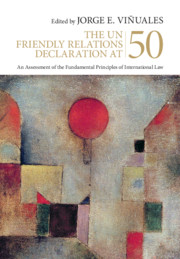 The UN Friendly Relations Declaration at 50
The UN Friendly Relations Declaration at 50 Book contents
- The UN Friendly Relations Declaration at 50
- The UN Friendly Relations Declaration at 50
- Copyright page
- Dedication
- Epigraph
- Contents
- Contributors
- Abbreviations
- Introduction
- 1 The System of the Friendly Relations Declaration
- 2 The Historical Origins and Setting of the Friendly Relations Declaration
- Part I The Principles of the Friendly Relations Declaration
- Part II Fundamental Principles of International Law beyond the Friendly Relations Declaration
- Appendix The Friendly Relations Declaration (also available at www.un-documents.net/a25r2625.htm)
- Index
1 - The System of the Friendly Relations Declaration
Published online by Cambridge University Press: 21 September 2020
- The UN Friendly Relations Declaration at 50
- The UN Friendly Relations Declaration at 50
- Copyright page
- Dedication
- Epigraph
- Contents
- Contributors
- Abbreviations
- Introduction
- 1 The System of the Friendly Relations Declaration
- 2 The Historical Origins and Setting of the Friendly Relations Declaration
- Part I The Principles of the Friendly Relations Declaration
- Part II Fundamental Principles of International Law beyond the Friendly Relations Declaration
- Appendix The Friendly Relations Declaration (also available at www.un-documents.net/a25r2625.htm)
- Index
Summary
The UN Charter was designed to institutionalise and project into the future the ‘Alliance of the Victorious Powers’ of the Second World War, as well as their vision of what the post-war world should be. Such vision harboured great potentialities for the future, but it was largely premised, consciously or unconsciously, on the image and presumed structures of the pre-existing world as reflected in classical international law. This heritage is clearly apparent in Article 2 of the Charter, which lays down the ‘principles’ of the United Nations.
Information
- Type
- Chapter
- Information
- The UN Friendly Relations Declaration at 50An Assessment of the Fundamental Principles of International Law, pp. 12 - 22Publisher: Cambridge University PressPrint publication year: 2020